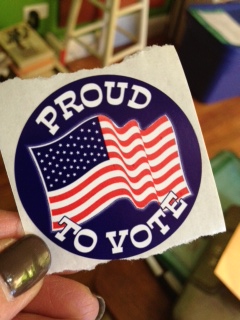Some quick, unedited thoughts in reaction to tonight’s premiere (FINALLY) of ABC’s Fresh Off the Boat because I want to know your thoughts. I’ll go first. (THERE ARE SOME SORT OF SPOILERS…)
- I liked it. I thought it was funny. I like the kind of funny where I laugh out loud, and I laughed out loud. And my sons who are 15 and 13 sat down with me to watch both episodes and laughed, related, and repeated lines.
- Constance Wu’s portrayal of the mother Jessica Huang was lovely. She loves her children and her husband, but she isn’t going to take things lying down. She doesn’t mince words, but she isn’t one-dimensional. Hmmmm.
- There were as many “jabs” at white culture/people as there were stereotypes of Asian/Taiwanese American culture. White people food, white people bowing, white suburban SAHMs talking loudly, fast, and over anyone else alongside the grandmother who doesn’t speak English, stinky Asian food, and Chinese Learning Centers (CLC, which of course my sons thought meant College of Lake County). I grew up calling white people and their food “Americans” and “American food,” which to some degree still holds true in American culture.
- There were so many moments that sent me back to childhood. The stinky food thing. My sons started reminding each other about “the time you brought insert-some Asian food-here” to school and what reactions they received. My parents sometimes still talk about how their clothes smell after being at Korean bbq restaurant. The CLC thing never happened, but the push to excel meant my parents MADE Korean language worksheets and photocopied academic workbooks (I couldn’t write inside of them because they would re-use the book for my younger sister or make new copies of sheets when I didn’t complete them correctly) for us to do OVER THE SUMMER.
- Yes, some of those things that rang true border on stereotypes, which is probably why I read many, many comments about how the show was good but not perfect…
- But WHY DOES THIS SHOW HAVE TO BE PERFECT??? Why are so many of us Asian Americans adding that caveat? How many shows are perfect? I get it. This is the first show in 20 years featuring a family that looks remotely like mine so there is a lot of pressure. The pressure is real in terms of the network, etc. but it isn’t real in that the “Asian American community” does not, should not carry the burden of perfectly representing our story because there is no one story. I understand the burden in so many ways, but again I want to be held accountable and hold others accountable. How might we be perpetuating the stereotype of the model minority by expecting, even daresay hoping, this show, this ONE SHOW, would perfectly represent a multicultural community? It can’t.
- I’m grateful the show took on double standards and the word “chink.” I was caught a little off guard when it happened because you never get used to that, and why should we. But when the parents defended Eddie and asked why the other boy, who was black, and his parents were not in the principal’s office for using a racial epithet I said, “YES!” Now, I don’t know how many Taiwanese parents would’ve done that, but as a parent and as an adult who still hears “chink” thrown at me or my family I appreciated the call out. For the record, I didn’t punch back because I wasn’t going to start something I couldn’t finish. I swore back in Korean.
- It mattered to my sons. I was surprised that they wanted to sit with me to watch it live because who does that anymore. But there they were laughing and following along. They both agreed it will go into the DVR queue and when asked why they liked it both of them said they liked seeing Asians on tv. “The Asians. They are like us.” Yes, they are.
OK. Unfiltered, quick, off-the-cuff thoughts to jump into the conversation. I’d love to hear from all of you, Asian and non-Asian American!!
- Did you watch it? Why or why not?
- If you watched it, what did you think?
- What did you like the most? What made you cringe? Why?
- What were the things you resonated with? What didn’t you understand or get?
- Whatever else you want to add. 🙂
